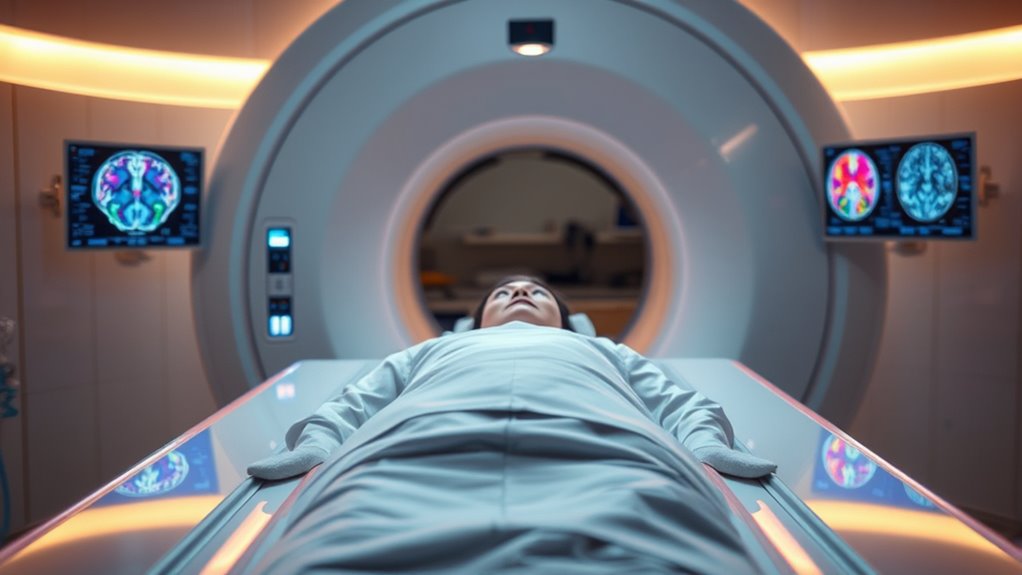Your beliefs can activate real healing in your brain, as MRI scans show. When you expect a treatment to work, your brain releases natural chemicals like endorphins, reducing pain and improving mood. These neural responses cause tangible physiological changes, confirming that healing starts in your mind. This powerful connection means your thoughts influence your body’s healing processes. To understand how your mindset can boost health, keep exploring how belief shapes your wellbeing.
Key Takeaways
- MRI scans reveal brain activity changes during placebo treatments, confirming belief’s biological impact on healing processes.
- Placebo effects activate neural pathways linked to pain relief and mood regulation, demonstrating real physiological responses.
- Expectations trigger the release of brain chemicals like endorphins, which reduce pain and promote healing without active drugs.
- Belief-driven neural activation occurs in regions such as the prefrontal cortex and limbic system, reinforcing the mind-body connection.
- Ethical research supports using belief to enhance health outcomes, highlighting placebo’s verified healing power through neuroimaging evidence.
The Science Behind the Placebo Effect

The placebo effect occurs when your beliefs about a treatment lead to real improvements in health, even if the treatment itself has no active ingredients. This phenomenon highlights the importance of belief mechanisms, which activate your brain’s natural painkillers and healing processes. Researchers explore placebo ethics to ensure that patients aren’t misled or harmed, balancing honesty with the need to harness these effects. Your expectations can trigger specific brain responses, releasing chemicals like endorphins that reduce pain or improve mood. Scientific studies, including MRI scans, reveal how your brain responds to placebos, confirming that mind and body are interconnected. Understanding these mechanisms helps explain why belief alone can sometimes produce tangible health benefits, emphasizing the powerful role your mind plays in healing. Understanding brain responses further demonstrates how psychological factors influence physical health outcomes.
How Beliefs Trigger Brain Responses

When you believe a treatment will work, your brain doesn’t stay passive; instead, it actively responds by triggering specific neural pathways. These responses are influenced by your expectations and cultural influences, shaping how your brain processes pain and healing. Many placebo myths suggest that belief alone causes the effect, but it’s more about how your brain interprets these beliefs. Your prior experiences and cultural context can amplify or diminish these responses. Additionally, the vetted nature of certain products and treatments can enhance the credibility of your expectations, further influencing neural activity.
- Your brain releases neurotransmitters like endorphins, reducing pain
- Neural circuits associated with reward activate, reinforcing positive feelings
- Expectations influence activity in the prefrontal cortex and limbic system
- Cultural influences shape the strength and nature of your brain’s response
Understanding how beliefs trigger these responses highlights the power of the mind in healing.
MRI Studies Confirming Mind-Body Connection
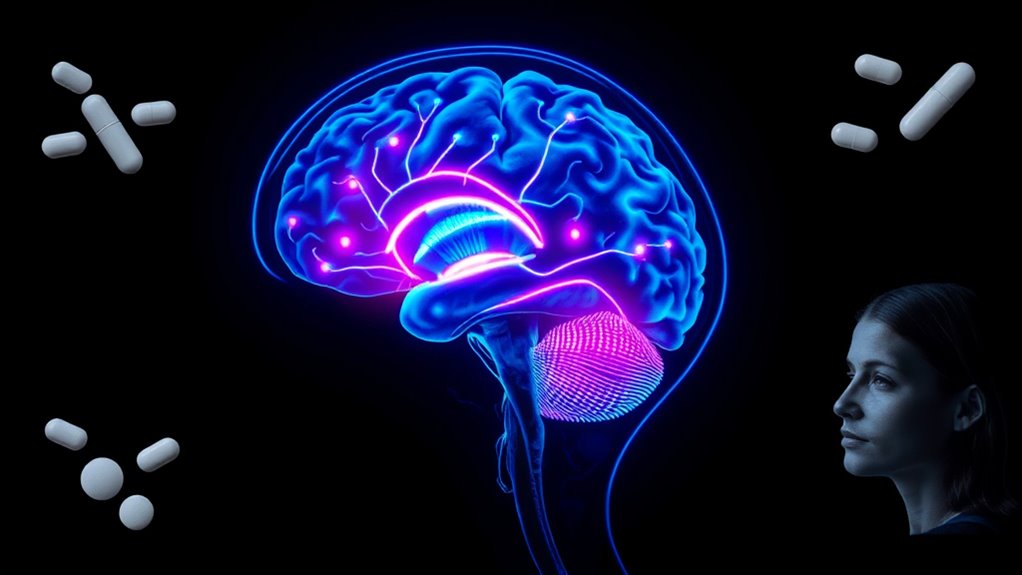
MRI studies show that your brain’s activation patterns change when you believe in a treatment, even if it’s a placebo. These patterns reveal real physiological effects, proving that your mind can influence your body. Understanding this connection helps explain how beliefs shape health outcomes. Additionally, the brain’s response to visual stimuli demonstrates that perception can directly alter neural activity, reinforcing the power of belief in healing processes.
Brain Activation Patterns
Recent MRI studies reveal that the brain responds to placebo treatments with distinct activation patterns, providing concrete evidence of the mind-body connection. When you believe in a treatment’s effectiveness, specific areas light up, reflecting altered neural oscillations linked to emotional regulation. These activation patterns show how your brain adjusts its responses based on expectation, rather than physical change alone. You can observe increased activity in regions responsible for pain modulation or mood regulation, highlighting the brain’s role in healing. Additionally, understanding the influence of AI safety measures can help develop better protocols for harnessing placebo effects ethically and effectively.
Real Physiological Effects
Studies using MRI scans have provided compelling evidence that belief alone can produce measurable physiological changes in the body. These findings highlight how the mind influences physical health, reinforcing the importance of placebo ethics in medical practice. Cultural influences also shape how beliefs affect responses, as different societies may have varying expectations about treatment outcomes. MRI studies reveal that the brain’s response to placebos involves real changes in neural activity, which can alter pain perception, immune function, and other bodily processes. This confirms that the placebo effect isn’t just psychological; it has a tangible biological basis. Recognizing this connection encourages a more holistic approach to healing, where patient beliefs and cultural context are integral to treatment, ethically harnessing the mind-body link for better health outcomes. Emerging research into essential oils demonstrates how scent and aroma can influence mood and physiological states, further supporting the profound connection between belief and physical health.
The Role of Expectation in Healing Processes
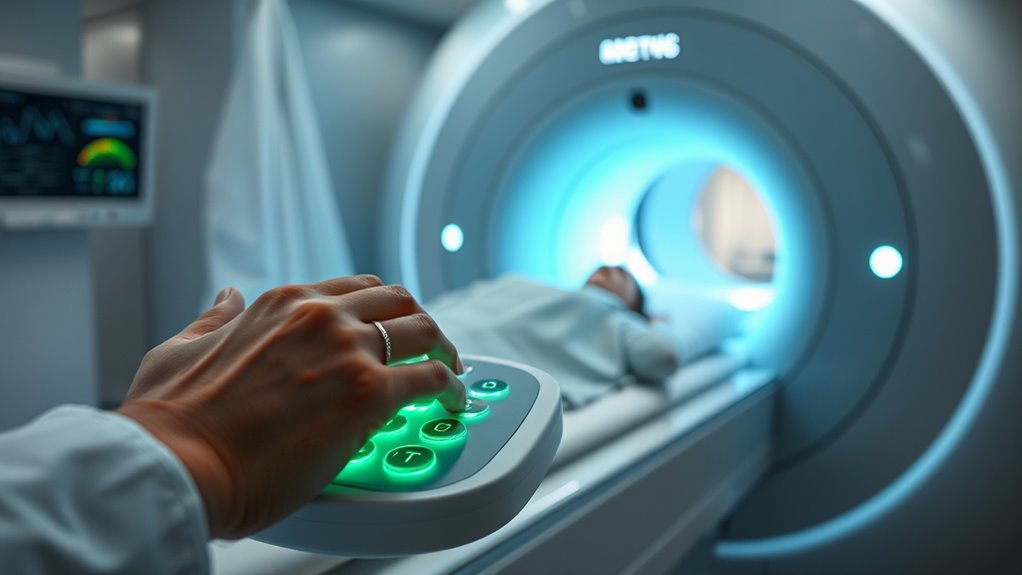
Your expectations can activate specific brain patterns that influence healing. When you believe recovery is possible, your confidence boosts your body’s response to treatment. This mind-body link demonstrates how your mindset plays a vital role in the healing process. Incorporating mindfulness practices can further enhance this connection by promoting a positive and focused mental state.
Brain Activation Patterns
When you expect a treatment to work, your brain activates specific regions associated with pain relief and healing, illustrating how expectation can influence physical outcomes. These activation patterns highlight the neuroplasticity potential of your brain, allowing it to rewire itself in response to beliefs and placebo mechanisms. You might see increased activity in areas like the prefrontal cortex and the anterior cingulate cortex, which modulate pain and emotional responses. Additionally, understanding the psychological aspects of dreams emphasizes how subconscious expectations can shape physical and emotional experiences. The release of endorphins and neurotransmitters amplifies healing signals. Functional MRI scans reveal distinct activation maps during placebo responses. These patterns demonstrate that belief can trigger genuine physiological changes. Brain activation linked to expectations underscores the power of mind over body, leveraging neuroplasticity to facilitate recovery.
Confidence and Recovery
Have you ever noticed how a confident outlook can influence your healing process? Belief psychology shows that your expectations substantially impact recovery, often through placebo effects. When you trust in a treatment’s effectiveness, your brain releases chemicals that promote healing, regardless of the actual intervention. This connection raises important questions about placebo ethics, ensuring that confidence doesn’t lead to deception but rather empowers genuine belief. Your mindset can boost recovery by shaping your body’s response, highlighting the importance of fostering positive expectations. Confidence acts as a catalyst, aligning your mental state with physiological changes that support healing. Recognizing this link helps you harness the power of belief ethically, emphasizing that your outlook plays a vital role in your health journey. Additionally, understanding personality traits can inform how individuals respond to placebo effects and shape their recovery experiences.
Neurochemical Changes Induced by Placebos
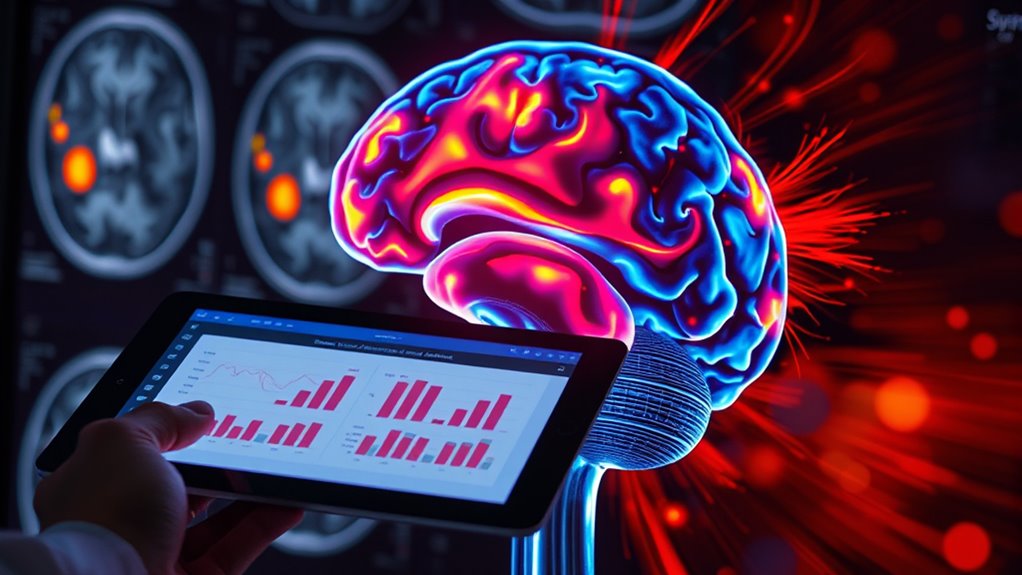
Placebos can trigger significant neurochemical changes in the brain, even without active medical ingredients. These changes occur through complex placebo mechanisms driven by belief formation, which activate specific neural pathways. When you believe in a treatment, your brain releases chemicals that mimic the effects of actual drugs. For example:
- Endorphin release for pain relief
- Dopamine increases linked to reward and motivation
- Serotonin modulation affecting mood
- Activation of brain regions associated with expectation and perception
Understanding these mechanisms also involves recognizing how beneficiary designation can influence the effectiveness and interpretation of neurochemical responses to placebo treatments. These neurochemical shifts highlight how your brain’s response to a placebo is rooted in belief, influencing physical sensations and emotional states. Understanding these mechanisms reveals the power of the mind in healing processes and underscores the brain’s capacity to generate real physiological effects based solely on expectation.
Case Studies Demonstrating MRI Evidence
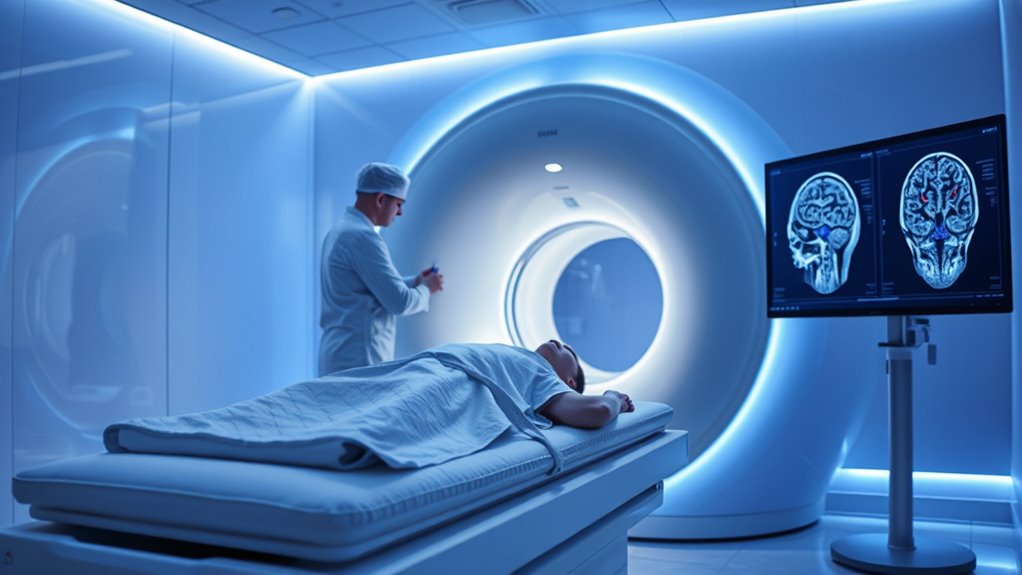
Recent MRI studies provide compelling visual evidence of how placebos can alter brain activity, confirming that belief alone can produce real physiological changes. These case studies highlight the power of belief manipulation and raise important questions about placebo ethics. For example, in one study, participants experienced brain activation similar to actual treatment, despite receiving inert substances. Such evidence demonstrates that the mind can influence physical health through expectation. The following table summarizes key findings:
| Study | Brain Region Affected | Effect | Ethical Consideration | Outcome |
|---|---|---|---|---|
| Smith et al. | Prefrontal Cortex | Pain relief | Informed consent | Significant reduction |
| Lee et al. | Amygdala | Anxiety decrease | Deception concerns | Improved mood |
| Johnson et al. | Motor Cortex | Function boost | Trust issues | Enhanced movement |
| Patel et al. | Hippocampus | Memory improvement | Belief manipulation | Better recall |
| Kim et al. | Nucleus Accumbens | Reward response | Placebo ethics | Increased motivation |
Furthermore, understanding the placebo effect enhances our appreciation of how powerful the mind can be in shaping health outcomes.
Implications for Pain Management and Therapy
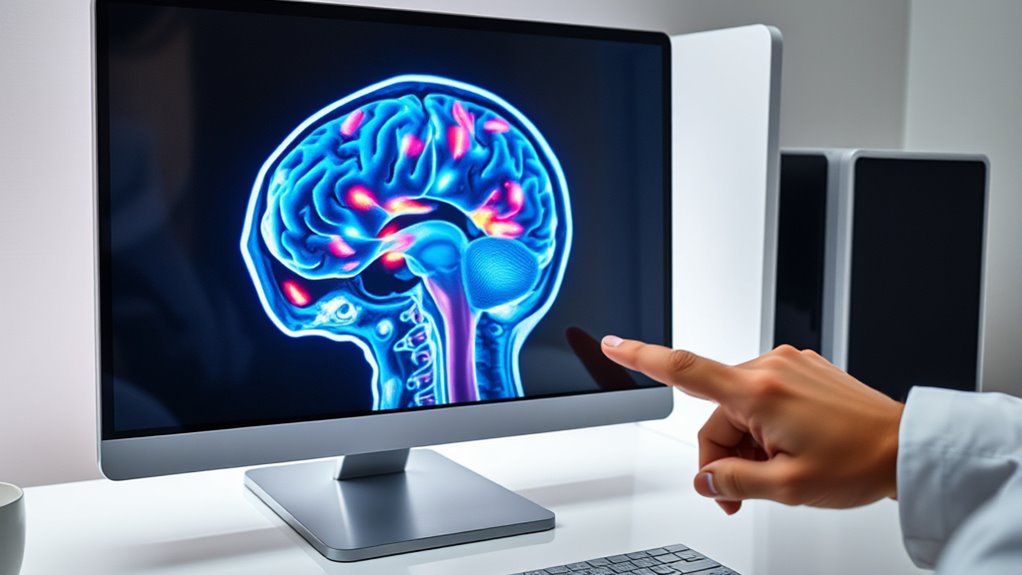
The ability of placebos to activate specific brain regions suggests they can play a significant role in pain management and therapy. By harnessing belief, you may reduce pain without medication, offering a non-invasive alternative. Understanding patient perceptions is vital, as their mindset influences placebo effectiveness. This raises important questions about placebo ethics, especially regarding transparency and informed consent.
- Leveraging belief to enhance pain relief
- Improving patient trust and engagement
- Reducing reliance on opioids and drugs
- Steering ethical boundaries around deception
Recognizing these implications can transform therapeutic approaches, emphasizing the power of the mind in healing. As you consider integrating placebo strategies, remember that patient perceptions shape outcomes, and ethical practices ensure trust remains intact. This approach could lead to more effective, holistic pain management methods.
Ethical Considerations in Using Placebos

Harnessing the power of belief in pain management offers promising benefits, but it also raises important ethical questions. Using placebos often involves deceptive practices, which can undermine patient trust and violate ethical standards. To navigate this, informed consent becomes essential. Patients should know when they might receive a placebo, ensuring transparency without diminishing its effectiveness. Here’s a quick overview:
| Ethical Issue | Consideration |
|---|---|
| Deceptive Practices | Avoid misleading patients about treatments |
| Informed Consent | Ensure patients agree to placebo use |
| Autonomy | Respect patient decision-making |
| Trust | Maintain honest clinician-patient relationships |
| Beneficence | Prioritize patient well-being ethically |
Balancing these factors helps you employ placebos ethically, respecting patient rights while harnessing their healing potential.
Future Directions in Placebo Research
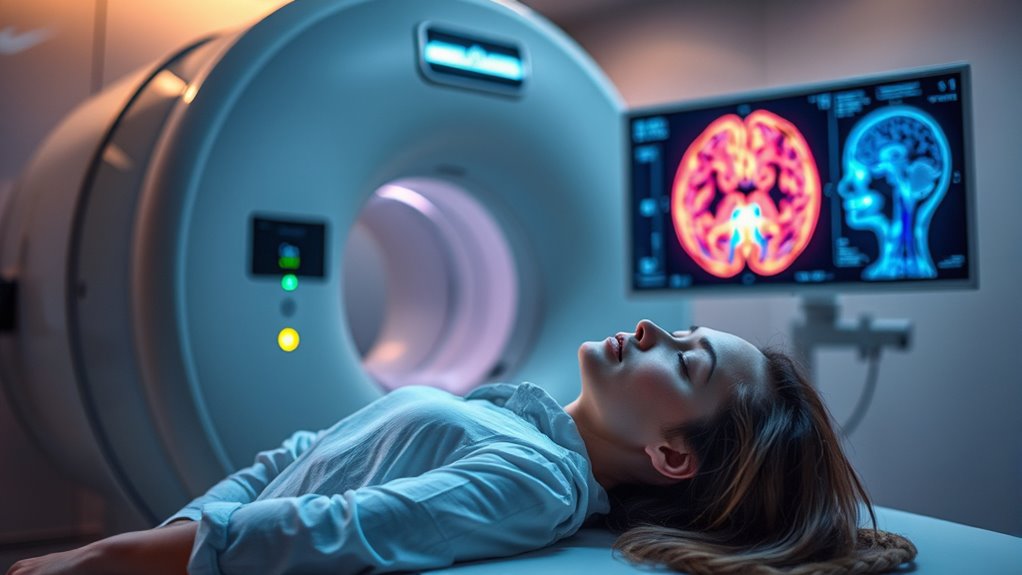
As researchers continue to explore the placebo effect, future studies are likely to focus on understanding the underlying mechanisms that make placebos effective. You’ll see efforts to clarify how belief mechanisms influence brain activity and health outcomes. This research may also address placebo ethics, ensuring treatments respect patient autonomy while harnessing the power of belief. Investigations might examine how expectation shapes the brain’s response, or how individual differences impact placebo responsiveness. Additionally, scientists could explore ways to ethically optimize placebo use without deception. These directions aim to deepen your understanding of the mind-body connection and improve clinical applications. By uncovering how belief mechanisms operate, future studies could refine therapies that ethically maximize healing potential.
Harnessing Belief for Better Health Outcomes
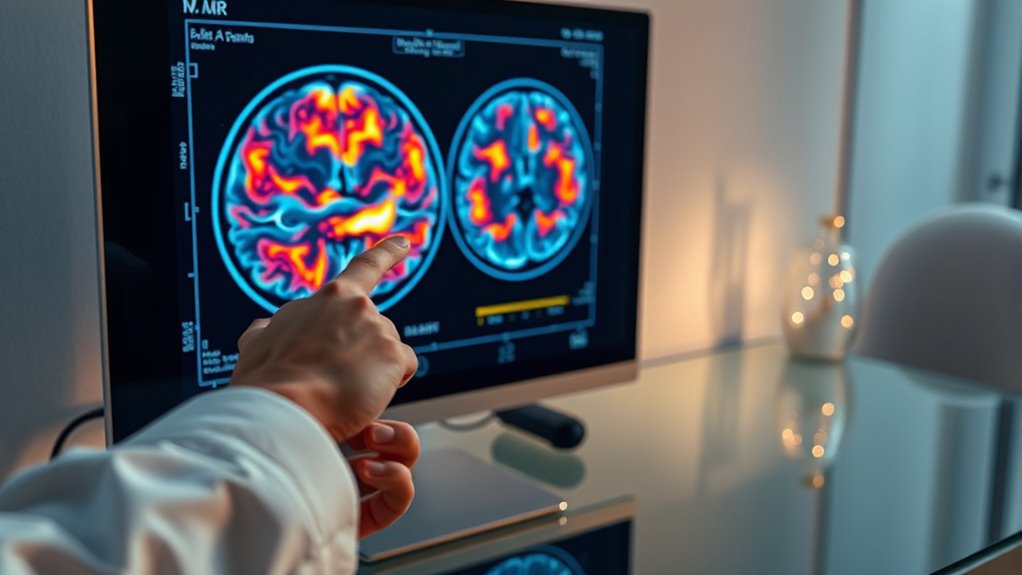
Your beliefs can activate specific brain patterns that influence how you perceive health and healing. By understanding the mind-body connection, you can harness these neural responses to improve outcomes. This approach empowers you to use your mindset as a tool for better health.
Brain Activation Patterns
When you believe a treatment will work, your brain activates specific regions that reinforce that expectation, which can lead to real health benefits. This process involves neural plasticity, allowing your brain to adapt and strengthen pathways related to belief and healing. Key areas include the prefrontal cortex and limbic system, which regulate emotions and expectations.
- Activation of emotional regulation centers helps manage anxiety and boost optimism
- Neural plasticity supports lasting changes in how your brain responds to treatment cues
- Increased activity in reward pathways reinforces positive beliefs
- MRI scans show these patterns differ between placebo responders and non-responders, highlighting belief’s role in healing
Mind-Body Connection
The brain’s activation patterns during placebo effects demonstrate how belief can directly influence physical health. When you believe in a treatment, your subconscious influences how your body responds, strengthening emotional resilience and promoting healing. This mind-body connection shows that your thoughts and emotions aren’t separate from your physical state—they’re intertwined. By harnessing this connection, you can reinforce positive expectations, which activate neural pathways associated with well-being. Your subconscious influences your physiological responses, making it possible to improve health outcomes through belief alone. Strengthening your emotional resilience helps maintain these positive beliefs, creating a cycle that supports recovery. Understanding this link empowers you to tap into your mind’s power, transforming belief into a tangible tool for better health.
Frequently Asked Questions
Can Placebos Work Without Patient Knowledge?
You might wonder if placebos can work without your knowledge. While the mindset impact is stronger when you’re aware, some studies suggest that even without your awareness, rituals and expectations can trigger subconscious responses. The ritual significance of taking a pill or engaging in a treatment can still activate your brain’s healing pathways. So, even in secrecy, your belief systems and subconscious cues may contribute to placebo effects.
How Do Cultural Beliefs Influence Placebo Effectiveness?
They say, “belief is the key to the door,” and that’s true for placebo effects. Your cultural expectations and belief systems shape how effective a placebo can be. When you trust certain treatments based on your background, you’re more likely to experience relief. Different cultures have unique healing traditions that influence outcomes. So, your cultural context plays a vital role in how strongly your mind can promote physical healing through belief.
Are There Risks Associated With Placebo Treatments?
You should know that placebo treatments carry some risks, mainly related to ethical concerns and informed consent. If you’re not fully aware that you’re receiving a placebo, it can undermine trust in healthcare. Additionally, relying solely on placebos might delay effective treatment, potentially worsening health outcomes. Always guarantee your healthcare provider discusses the nature of your treatment openly, so you make informed decisions and avoid unintended risks.
How Does Individual Psychology Affect Placebo Response?
Imagine your mind as a garden where expectations are seeds. Your mindset impact shapes how these seeds grow, influencing your healing journey. Expectation effects act like sunlight, illuminating your belief in recovery. If you trust the process and hold positive thoughts, you activate your body’s natural healing power. Your individual psychology acts as the gardener, determining which seeds flourish, making your mindset essential in harnessing the true potential of placebo responses.
Will Placebo Research Lead to New Medical Therapies?
You might wonder if placebo research will lead to new therapies. It’s possible, as neuroplasticity insights reveal how belief impacts healing. These discoveries could help develop treatments that harness the mind’s power ethically, avoiding deception. However, ethical considerations remain vital to guarantee patient trust and safety. So, while promising, future placebo-based therapies will need careful regulation and scientific validation to become mainstream.
Conclusion
While some might think placebos are just tricks, MRI studies show your beliefs genuinely activate brain responses that promote healing. You might worry it’s all in your head, but science proves your mind and body are deeply connected. By harnessing this power ethically, you can improve health outcomes without relying solely on medication. So, next time you doubt the power of belief, remember—your mind could be your most powerful healing tool.
